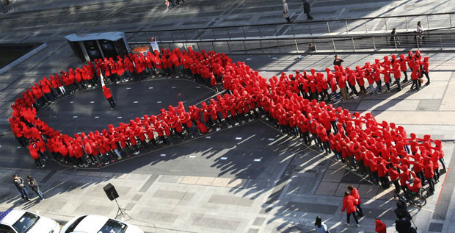Growing Anti-gay attitudes in Indonesia will hamper efforts to combat rising levels of HIV among gay and bisexual men in the country, making it impossible to hit 2030 target of eradicating Aids.
UNAids estimates there are around 690,000 people living with HIV in Indonesia.
HIV among men who have sex with men in Indonesia rose to 25.8 per cent in 2015 from just 5.4 per cent in 2007, according to a.
“In terms of number, MSM is the fastest growing [group],” the commission’s secretary Kemal Siregar told the Thomson Reuters Foundation.
Siregar said that rising social stigma against LGBT in the country was making it harder to reach out to men who have sex with men and stem the rise in new infections.
He also noted that as Indonesia’s economy has grown, international aid has dropped, meaning less resources to fight the epidemic.
“If the funding is not there, it’s very hard to reach this group because the government’s funding is mostly for treatment, for medicines, not for prevention,” the official said.
Despite this, the National Aids Commission is reaching out to men who have sex with men and plan to launch LGBT-friendly clinics outside of the cities in which they currently operate
“They have to know this community, they have to reduce the stigma and have the communication skills to communicate with this group,” Siregar said.
Growing Anti-gay attitudes in Indonesia will hamper efforts to combat rising levels of HIV among gay and bisexual men in the country, making it impossible to hit 2030 target of eradicating Aids.
UNAids estimates there are around 690,000 people living with HIV in Indonesia.
HIV among men who have sex with men in Indonesia rose to 25.8 per cent in 2015 from just 5.4 per cent in 2007, according to a.
“In terms of number, MSM is the fastest growing [group],” the commission’s secretary Kemal Siregar told the Thomson Reuters Foundation.
Siregar said that rising social stigma against LGBT in the country was making it harder to reach out to men who have sex with men and stem the rise in new infections.
He also noted that as Indonesia’s economy has grown, international aid has dropped, meaning less resources to fight the epidemic.
“If the funding is not there, it’s very hard to reach this group because the government’s funding is mostly for treatment, for medicines, not for prevention,” the official said.
Despite this, the National Aids Commission is reaching out to men who have sex with men and plan to launch LGBT-friendly clinics outside of the cities in which they currently operate
“They have to know this community, they have to reduce the stigma and have the communication skills to communicate with this group,” Siregar said.

